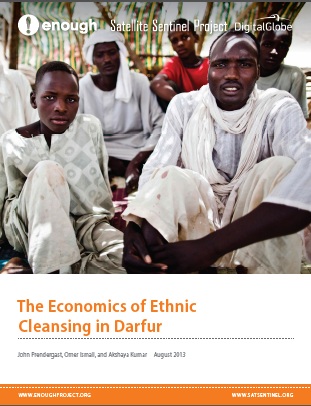
Darfur is burning again, with devastating results for its people. A kaleidoscope of Janjaweed forces are once again torching villages, terrorizing civilians, and systematically clearing prime land and resource-rich areas of their inhabitants. The latest ethnic-cleansing campaign has already displaced more than 300,000 Darfuris this year and forced more than 75,000 to seek refuge in neighboring Chad, the largest population displacement in recent years.
An economic agenda is emerging as a major driver for the escalating violence. At the height of the mass atrocities committed from 2003 to 2005, the Sudanese regime’s strategy appeared to be driven primarily by the counterinsurgency objectives and secondarily by the acquisition of salaries and war booty. Undeniably, even at that time, the government could have only secured the loyalty of its proxy Janjaweed militias by allowing them to keep the fertile lands from which they evicted the original inhabitants. Today’s violence is even more visibly fueled by monetary motivations, which include land grabbing; consolidating control of recently discovered gold mines; manipulating reconciliation conferences for increased “blood money”; expanding protection rackets and smuggling networks; demanding ransoms; undertaking bank robberies; and resuming the large-scale looting that marked earlier periods of the conflict.
Recently, many Janjaweed groups, including those incorporated into the Sudanese
government’s Border Guards and Central Reserve Police, have slipped out of government control as patronage networks have shrunk with declining government budgets. Janjaweed militias have increasingly undertaken criminal activities to make up for lost revenues. During the past six months, the regime has sought to bring many of their favored Janjaweed elements back into closer alliance around shared objectives. Throughout 2013, in addition to attacking Fur, Masalit, and other non-Arab ethnic groups,some of the regime’s favored Janjaweed militias have also targeted civilians from Arab tribes that were historically aligned with the government. The newly expanded scope of violence in Darfur is tied to the emergence of pressing economic imperatives, largely triggered by the loss of oil revenues following South Sudan’s secession in 2011.As the government struggles to develop alternative revenue streams and to pacify the increasingly restless Janjaweed militias, Sudanese government officials are increasingly willing to fan the flames of violence, even against some of their erstwhile allies.
Since the regime in Khartoum, Sudan, denies journalists, aid workers, and U.N. peacekeepers access to locations where civilian targeting is frequent, the killing, looting, and burning occurs in an information blackout.As a result, journalists and diplomats have mostly accepted the Sudanese government’s explanation that the latest resurgence of violence is the inevitable product of intractable “inter-tribal” hatred between groups. Circumscribed by restrictions from Khartoum, the African Union – United Nations Mission in Darfur, or UNAMID, provides minimal protection to civilians and has not yet adjusted to the deepening economic and security drivers of the rapidly intensifying conflict.
Though it is true that competing Arab groups have clashed in the past, the Sudanese
government’s role in exacerbating recent disputes and benefiting from the growing intercommunal strife is being ignored. Drawing on firsthand interviews with refugees on the
Chadian border with Darfur, as well as many others inside Sudan, this report challenges
the oversimplification of intertribal causes and highlights the Sudanese government’s
role and ongoing interest in the latest rounds of violence.
In light of the comprehensive roots of the problems in Darfur, we recommend a way forward that would prioritize the creation of a comprehensive peace process that addresses all
of Sudan’s conflicts in one forum, maximizing participation from a wide swath of elements
of civil society, opposition, rebels, and government. Unfortunately, the African Union Peace
and Security Council recently took a step in the opposite direction, calling for increased
international support for the failed Doha Document for Peace in Sudan, a process that
stovepipes Darfur’s conflict, promotes divisive deals with small rebel splinter factions, and
leaves the main rebels out of the process. The United States, which has a long history of
rhetorical support for a comprehensive approach, now must act with bold diplomacy to
promote a solution for the grievances of all Sudanese and provide new support to those elements inside Sudan that are on the front lines of the struggle for peace and democracy.

